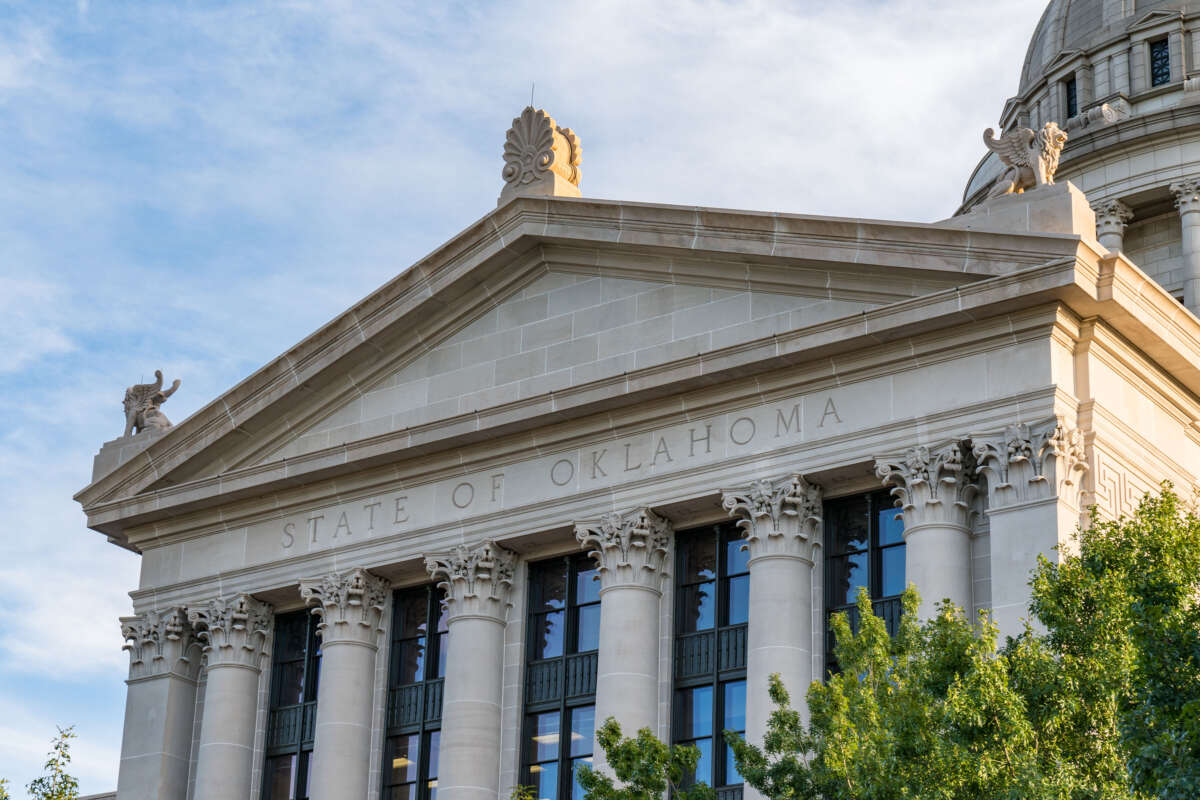Support justice-driven, accurate and transparent news — make a quick donation to Truthout today!
The Oklahoma Supreme Court has overturned a contract between the state and a religious school, ruling that a proposed charter school agreement is unconstitutional due to the institution’s stated plan to use government funding provided to evangelize students.
Oklahoma’s Statewide Virtual Charter School Board voted 3-2 last year to approve the Catholic Archdiocese of Oklahoma for the St. Isidore of Seville Virtual Charter School. Notably, that vote was not without its own controversy — appointees to the board are made by the governor and the state legislature, and the deciding vote in favor of giving St. Isidore’s charter school status came from someone appointed just days before the vote took place.
The issue of granting a religious school charter school status has split Republican lawmakers in the state, with Gov. Kevin Stitt and state Superintendent of Public Schools Ryan Walters backing the idea, but state Attorney General Gentner Drummond viewing it as unconstitutional. Drummond argued against giving St. Isidore’s charter status before the state Supreme Court on behalf of parents, faith leaders and educational groups who had sued to stop the school’s contract with the state from moving forward.
In a 6-2 decision by the state’s highest court, with one justice recusing from the matter, the justices said the proposed charter school violated the U.S. Constitution’s First Amendment regulations on government endorsement of religion. The charter school status for St. Isidore, which had stated clearly that it intended to teach religious themes using state funds, also violated state law, the justices noted.
“Under Oklahoma law, a charter school is a public school. As such, a charter school must be nonsectarian,” said Justice James Winchester, writing in the opinion of the court.
Entertaining the notion that the state could use taxpayer funds to help the religious entity open a school would be “a slippery slope,” Winchester stated, adding:
St. Isidore will evangelize the Catholic faith as part of its school curriculum while sponsored by the State. This State’s establishment of a religious charter school violates Oklahoma statutes, the Oklahoma Constitution, and the Establishment Clause.
“The St. Isidore Contract violates state and federal law and is unconstitutional,” Winchester said in the opinion, ordering the contract between the state and the school to be rescinded.
The school has vowed to continue pursuing charter school status, and it’s likely the matter will be appealed to the U.S. Supreme Court.
The case is being closely watched by religious activists on the far right, who are curious if the current conservative majority on the federal Supreme Court is willing to overturn decades of precedent regarding restrictions on government spending for religious purposes. The Court has previously ruled on two matters over the past four years regarding religious schools, finding that states cannot discriminate against religious institutions if they allocate funds to private schools in general.
The ruling from the Oklahoma Supreme Court was lauded by groups opposed to using taxpayer monies to fund religious causes.
“The Oklahoma Supreme Court’s decision safeguards public education and upholds the separation of religion and government,” read a joint statement from Americans United for Separation of Church and State, the American Civil Liberties Union, the Education Law Center, and other like-minded organizations. “Charter schools are public schools that must be secular and serve all students. St. Isidore of Seville Catholic Virtual School, which plans to discriminate against students, families and staff and indoctrinate students into one religion, cannot operate as a public charter school.”
A terrifying moment. We appeal for your support.
In the last weeks, we have witnessed an authoritarian assault on communities in Minnesota and across the nation.
The need for truthful, grassroots reporting is urgent at this cataclysmic historical moment. Yet, Trump-aligned billionaires and other allies have taken over many legacy media outlets — the culmination of a decades-long campaign to place control of the narrative into the hands of the political right.
We refuse to let Trump’s blatant propaganda machine go unchecked. Untethered to corporate ownership or advertisers, Truthout remains fearless in our reporting and our determination to use journalism as a tool for justice.
But we need your help just to fund our basic expenses. Over 80 percent of Truthout’s funding comes from small individual donations from our community of readers, and over a third of our total budget is supported by recurring monthly donors.
Truthout has launched a fundraiser, and we have a goal to add 231 new monthly donors in the next 48 hours. Whether you can make a small monthly donation or a larger one-time gift, Truthout only works with your support.
